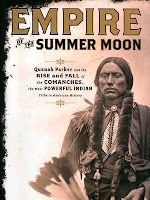
This book was about the progressive fall of the Comanche Indians, as told through the story line of Cynthia Ann Parker and her son, Quanah Parker – the last great Comanche chief.
I thought the first and third quarters of the book were interesting but the middle part was a little harder to get through. I think I just like the humanist side of relating to either Cynthia or Quanah but the middle section of the book focuses on the systematic destruction of the tribes by the Mexican, Texan and US governments and while heart-breaking/fascinating – war maneuvers don’t typically hold my attention.
This book actually got me a little riled up but I couldn’t honestly decide who’s “side” I was on each time I started to rant about a particular piece from it. Yes, the Indian attacks were horrific – rape, murder of non-combatants, scalping, torture, kidnapping – all despicable, despicable things BUT then there are two parts to think about.
1 – Of course, I would do anything to defend myself/ my family if I felt we were being encroached upon and essentially had a target on our heads
2 – The book makes the point that this was their way of life. The Plains Indians, Comanche’s in particular, were a war society – it wasn’t just white settlers they did this to it was to any enemy - so they didn’t think they were being unusually caustic or acting outside the normal set of agreed upon war responses.
Then when I start thinking about the settlers – the early ones really had to be either crazy or dim-witted to move out to where they did. It would be the rough equivalent of setting up shop in Afghanistan right now, not really the place to see and be seen folks! But that is what makes us Texans great – bull-headed as all but we will keep our land and guns, won’t we?
So while Manifest Destiny was not a term used at this time – the concept was there and people were pushing west. Who wouldn’t want to go? Explore uncharted territory; find anything that wasn’t one of the over-crowded eastern sea-board cities?! So they go, being told they can and that the government wants them to (Fun Fact: The Mexicans enticed people to settle Texas to ostensibly be a first barrier against the raiding Comanches).
So these people feel they have every right to move west and are appalled at the atrociously violent raids against them so they react in a variety of ways – successively more violent over the years.
Are the Indians right that their land/culture/livelihood was taken from them and no response is an over-reaction OR are the settlers right to be able to push forth into new worlds of discovery as the nation was being built? There are obvious moral aspects of this that tip the argument (genocide being one) but I just can’t fall fully on one side. I think that if it wasn’t the white settlers, it would have been another invading group eventually.
Anyways, great book – completely recommend. Hope someone reads it so I can see what you think!!



